Professional Identity 92434: Adolescent Confidentiality Case Study
VerifiedAdded on 2022/12/26
|7
|1945
|1
Case Study
AI Summary
This case study focuses on a nursing scenario involving a minor, Jessica Wilson, who is potentially pregnant and does not want her suspected pregnancy revealed to her mother. The ethical dilemma centers on adolescent confidentiality and the nurse's responsibility to balance Jessica's autonomy with the potential need for parental involvement and healthcare intervention. The assignment explores relevant ethical principles such as autonomy, beneficence, nonmaleficence, and veracity, and considers legal frameworks like the mature minor principle and confidentiality laws in Australia and internationally. It examines how Sam, the nurse, can address the ethical issue of Jessica’s confidentiality and safety, including assessment of maturity, professional values, and the importance of building trust and establishing a therapeutic relationship with the adolescent. The assignment concludes with a mixed approach where the nurse will not inform Jessica’s mother about her pregnancy right away instead she would first take Jessica in confidence that family support is essential for her. Then, an open discussion among the concerned parties can take place to make a better, informed decision regarding Jessica’s suspicion pregnancy.
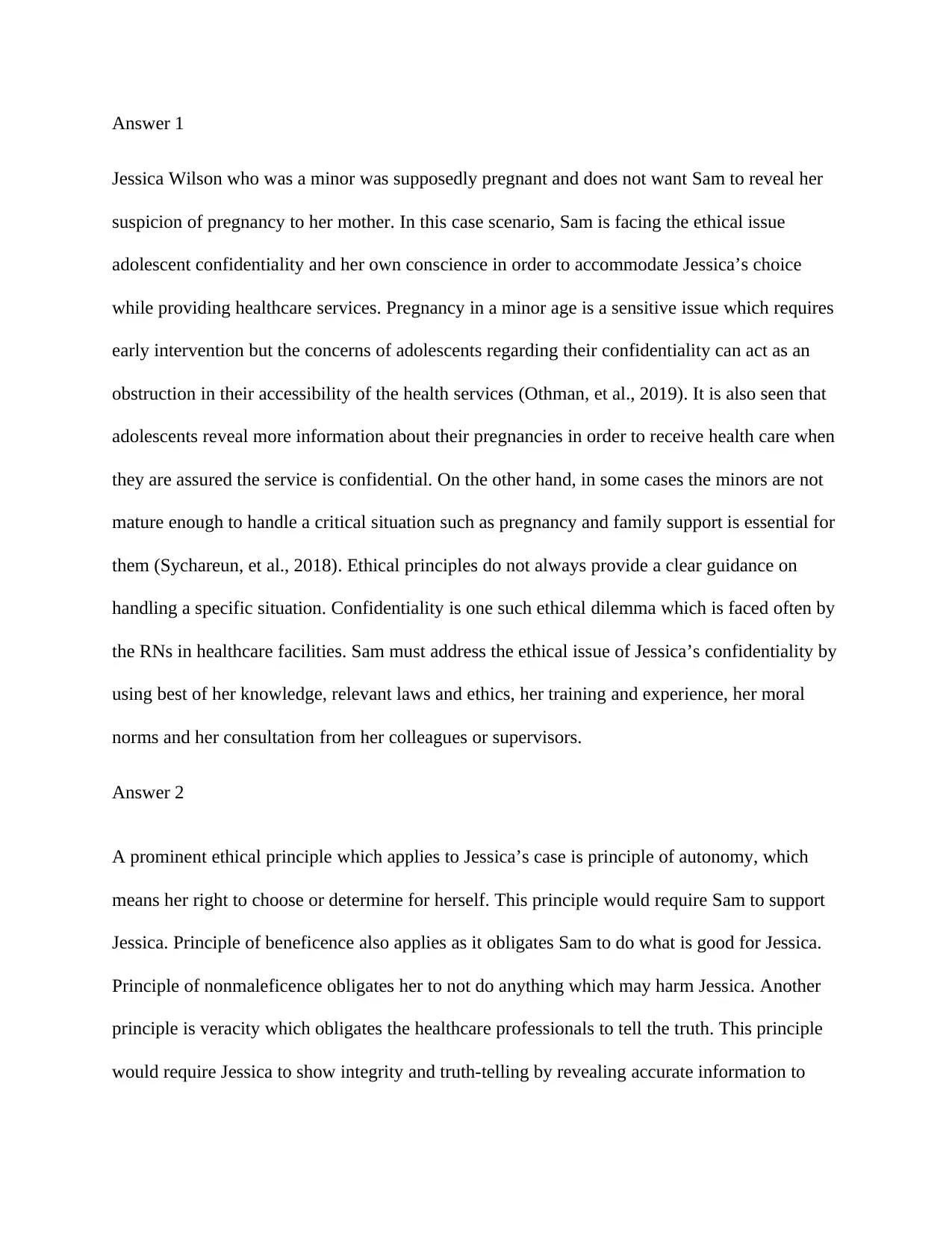
Answer 1
Jessica Wilson who was a minor was supposedly pregnant and does not want Sam to reveal her
suspicion of pregnancy to her mother. In this case scenario, Sam is facing the ethical issue
adolescent confidentiality and her own conscience in order to accommodate Jessica’s choice
while providing healthcare services. Pregnancy in a minor age is a sensitive issue which requires
early intervention but the concerns of adolescents regarding their confidentiality can act as an
obstruction in their accessibility of the health services (Othman, et al., 2019). It is also seen that
adolescents reveal more information about their pregnancies in order to receive health care when
they are assured the service is confidential. On the other hand, in some cases the minors are not
mature enough to handle a critical situation such as pregnancy and family support is essential for
them (Sychareun, et al., 2018). Ethical principles do not always provide a clear guidance on
handling a specific situation. Confidentiality is one such ethical dilemma which is faced often by
the RNs in healthcare facilities. Sam must address the ethical issue of Jessica’s confidentiality by
using best of her knowledge, relevant laws and ethics, her training and experience, her moral
norms and her consultation from her colleagues or supervisors.
Answer 2
A prominent ethical principle which applies to Jessica’s case is principle of autonomy, which
means her right to choose or determine for herself. This principle would require Sam to support
Jessica. Principle of beneficence also applies as it obligates Sam to do what is good for Jessica.
Principle of nonmaleficence obligates her to not do anything which may harm Jessica. Another
principle is veracity which obligates the healthcare professionals to tell the truth. This principle
would require Jessica to show integrity and truth-telling by revealing accurate information to
Jessica Wilson who was a minor was supposedly pregnant and does not want Sam to reveal her
suspicion of pregnancy to her mother. In this case scenario, Sam is facing the ethical issue
adolescent confidentiality and her own conscience in order to accommodate Jessica’s choice
while providing healthcare services. Pregnancy in a minor age is a sensitive issue which requires
early intervention but the concerns of adolescents regarding their confidentiality can act as an
obstruction in their accessibility of the health services (Othman, et al., 2019). It is also seen that
adolescents reveal more information about their pregnancies in order to receive health care when
they are assured the service is confidential. On the other hand, in some cases the minors are not
mature enough to handle a critical situation such as pregnancy and family support is essential for
them (Sychareun, et al., 2018). Ethical principles do not always provide a clear guidance on
handling a specific situation. Confidentiality is one such ethical dilemma which is faced often by
the RNs in healthcare facilities. Sam must address the ethical issue of Jessica’s confidentiality by
using best of her knowledge, relevant laws and ethics, her training and experience, her moral
norms and her consultation from her colleagues or supervisors.
Answer 2
A prominent ethical principle which applies to Jessica’s case is principle of autonomy, which
means her right to choose or determine for herself. This principle would require Sam to support
Jessica. Principle of beneficence also applies as it obligates Sam to do what is good for Jessica.
Principle of nonmaleficence obligates her to not do anything which may harm Jessica. Another
principle is veracity which obligates the healthcare professionals to tell the truth. This principle
would require Jessica to show integrity and truth-telling by revealing accurate information to
Paraphrase This Document
Need a fresh take? Get an instant paraphrase of this document with our AI Paraphraser
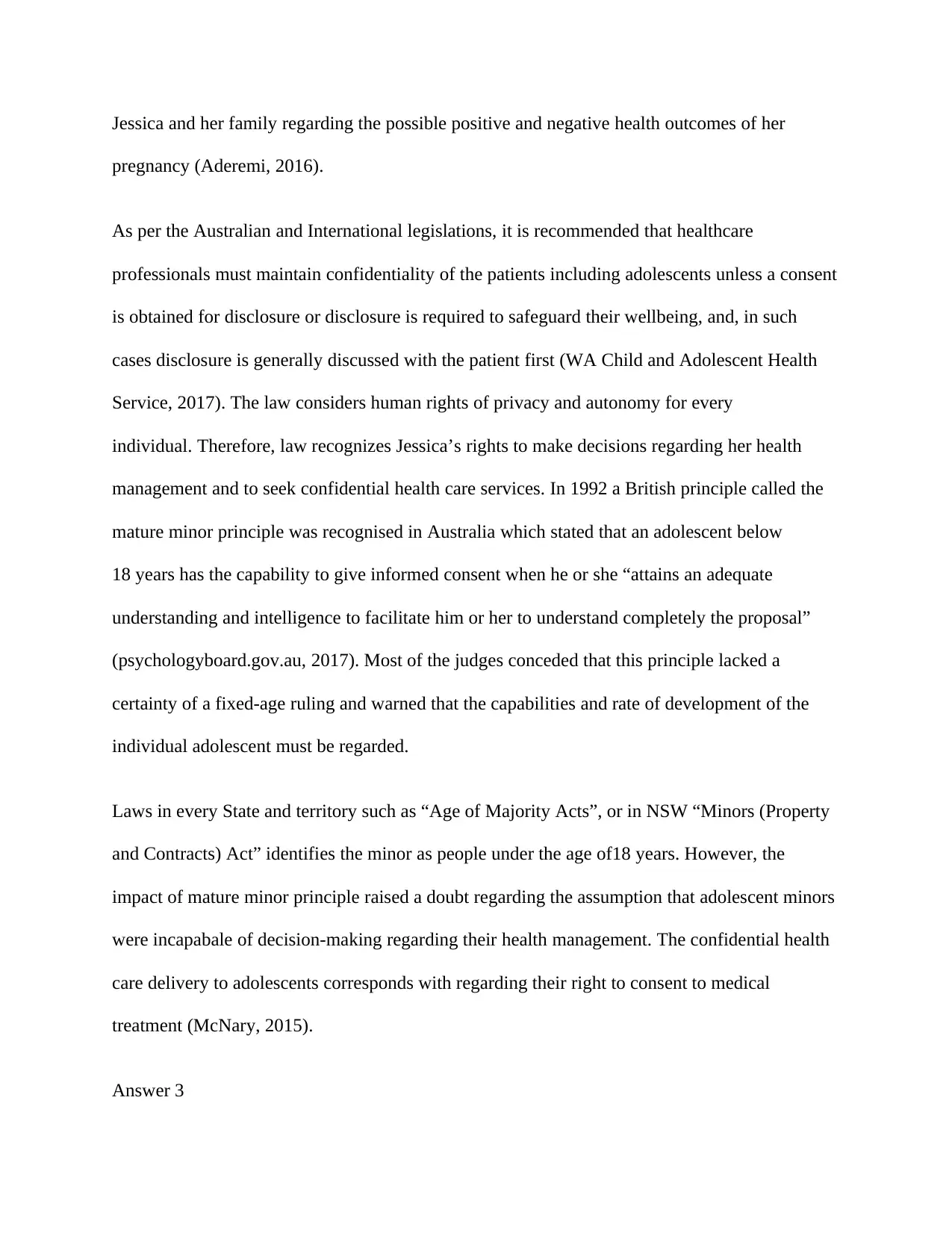
Jessica and her family regarding the possible positive and negative health outcomes of her
pregnancy (Aderemi, 2016).
As per the Australian and International legislations, it is recommended that healthcare
professionals must maintain confidentiality of the patients including adolescents unless a consent
is obtained for disclosure or disclosure is required to safeguard their wellbeing, and, in such
cases disclosure is generally discussed with the patient first (WA Child and Adolescent Health
Service, 2017). The law considers human rights of privacy and autonomy for every
individual. Therefore, law recognizes Jessica’s rights to make decisions regarding her health
management and to seek confidential health care services. In 1992 a British principle called the
mature minor principle was recognised in Australia which stated that an adolescent below
18 years has the capability to give informed consent when he or she “attains an adequate
understanding and intelligence to facilitate him or her to understand completely the proposal”
(psychologyboard.gov.au, 2017). Most of the judges conceded that this principle lacked a
certainty of a fixed-age ruling and warned that the capabilities and rate of development of the
individual adolescent must be regarded.
Laws in every State and territory such as “Age of Majority Acts”, or in NSW “Minors (Property
and Contracts) Act” identifies the minor as people under the age of18 years. However, the
impact of mature minor principle raised a doubt regarding the assumption that adolescent minors
were incapabale of decision-making regarding their health management. The confidential health
care delivery to adolescents corresponds with regarding their right to consent to medical
treatment (McNary, 2015).
Answer 3
pregnancy (Aderemi, 2016).
As per the Australian and International legislations, it is recommended that healthcare
professionals must maintain confidentiality of the patients including adolescents unless a consent
is obtained for disclosure or disclosure is required to safeguard their wellbeing, and, in such
cases disclosure is generally discussed with the patient first (WA Child and Adolescent Health
Service, 2017). The law considers human rights of privacy and autonomy for every
individual. Therefore, law recognizes Jessica’s rights to make decisions regarding her health
management and to seek confidential health care services. In 1992 a British principle called the
mature minor principle was recognised in Australia which stated that an adolescent below
18 years has the capability to give informed consent when he or she “attains an adequate
understanding and intelligence to facilitate him or her to understand completely the proposal”
(psychologyboard.gov.au, 2017). Most of the judges conceded that this principle lacked a
certainty of a fixed-age ruling and warned that the capabilities and rate of development of the
individual adolescent must be regarded.
Laws in every State and territory such as “Age of Majority Acts”, or in NSW “Minors (Property
and Contracts) Act” identifies the minor as people under the age of18 years. However, the
impact of mature minor principle raised a doubt regarding the assumption that adolescent minors
were incapabale of decision-making regarding their health management. The confidential health
care delivery to adolescents corresponds with regarding their right to consent to medical
treatment (McNary, 2015).
Answer 3
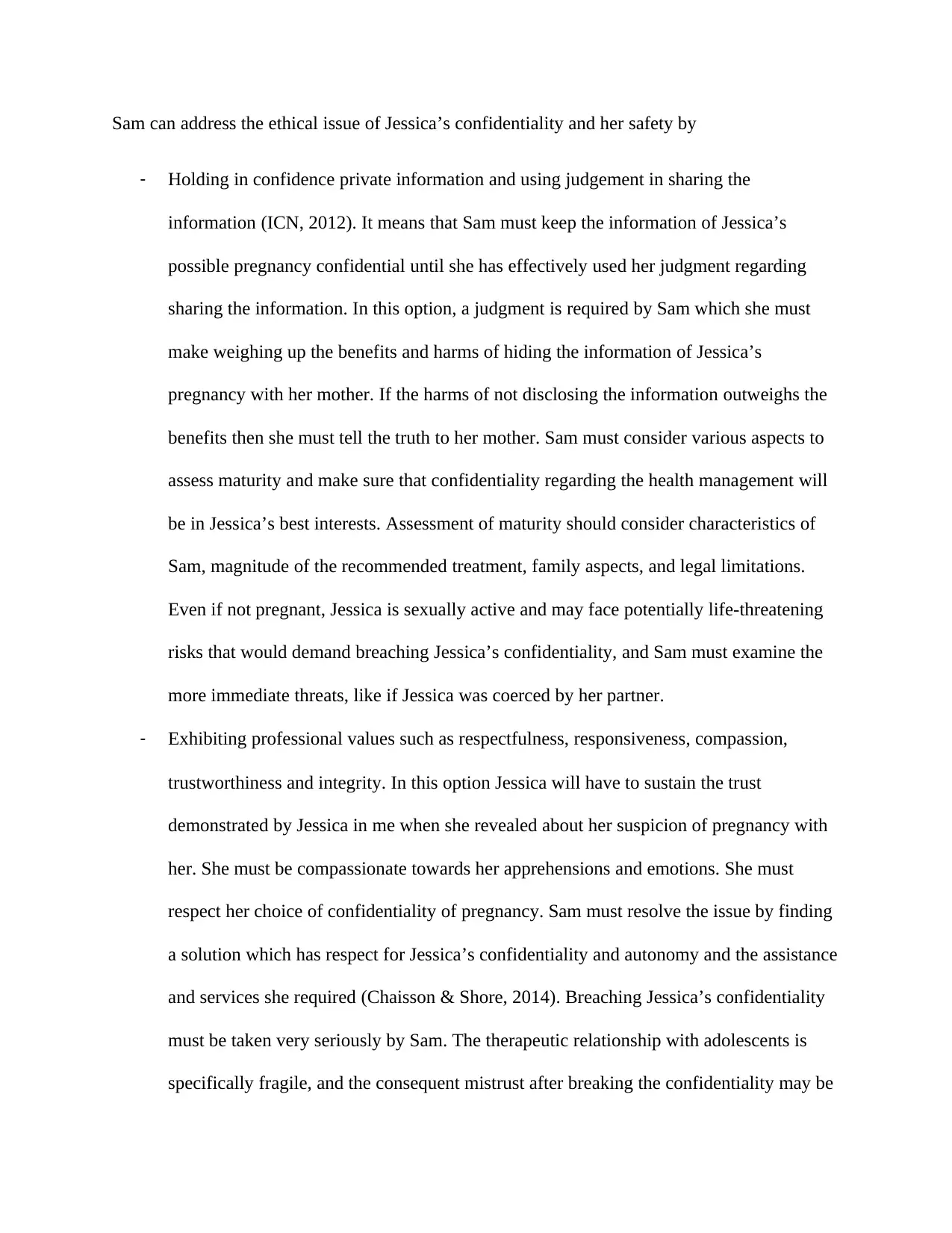
Sam can address the ethical issue of Jessica’s confidentiality and her safety by
- Holding in confidence private information and using judgement in sharing the
information (ICN, 2012). It means that Sam must keep the information of Jessica’s
possible pregnancy confidential until she has effectively used her judgment regarding
sharing the information. In this option, a judgment is required by Sam which she must
make weighing up the benefits and harms of hiding the information of Jessica’s
pregnancy with her mother. If the harms of not disclosing the information outweighs the
benefits then she must tell the truth to her mother. Sam must consider various aspects to
assess maturity and make sure that confidentiality regarding the health management will
be in Jessica’s best interests. Assessment of maturity should consider characteristics of
Sam, magnitude of the recommended treatment, family aspects, and legal limitations.
Even if not pregnant, Jessica is sexually active and may face potentially life-threatening
risks that would demand breaching Jessica’s confidentiality, and Sam must examine the
more immediate threats, like if Jessica was coerced by her partner.
- Exhibiting professional values such as respectfulness, responsiveness, compassion,
trustworthiness and integrity. In this option Jessica will have to sustain the trust
demonstrated by Jessica in me when she revealed about her suspicion of pregnancy with
her. She must be compassionate towards her apprehensions and emotions. She must
respect her choice of confidentiality of pregnancy. Sam must resolve the issue by finding
a solution which has respect for Jessica’s confidentiality and autonomy and the assistance
and services she required (Chaisson & Shore, 2014). Breaching Jessica’s confidentiality
must be taken very seriously by Sam. The therapeutic relationship with adolescents is
specifically fragile, and the consequent mistrust after breaking the confidentiality may be
- Holding in confidence private information and using judgement in sharing the
information (ICN, 2012). It means that Sam must keep the information of Jessica’s
possible pregnancy confidential until she has effectively used her judgment regarding
sharing the information. In this option, a judgment is required by Sam which she must
make weighing up the benefits and harms of hiding the information of Jessica’s
pregnancy with her mother. If the harms of not disclosing the information outweighs the
benefits then she must tell the truth to her mother. Sam must consider various aspects to
assess maturity and make sure that confidentiality regarding the health management will
be in Jessica’s best interests. Assessment of maturity should consider characteristics of
Sam, magnitude of the recommended treatment, family aspects, and legal limitations.
Even if not pregnant, Jessica is sexually active and may face potentially life-threatening
risks that would demand breaching Jessica’s confidentiality, and Sam must examine the
more immediate threats, like if Jessica was coerced by her partner.
- Exhibiting professional values such as respectfulness, responsiveness, compassion,
trustworthiness and integrity. In this option Jessica will have to sustain the trust
demonstrated by Jessica in me when she revealed about her suspicion of pregnancy with
her. She must be compassionate towards her apprehensions and emotions. She must
respect her choice of confidentiality of pregnancy. Sam must resolve the issue by finding
a solution which has respect for Jessica’s confidentiality and autonomy and the assistance
and services she required (Chaisson & Shore, 2014). Breaching Jessica’s confidentiality
must be taken very seriously by Sam. The therapeutic relationship with adolescents is
specifically fragile, and the consequent mistrust after breaking the confidentiality may be
⊘ This is a preview!⊘
Do you want full access?
Subscribe today to unlock all pages.

Trusted by 1+ million students worldwide
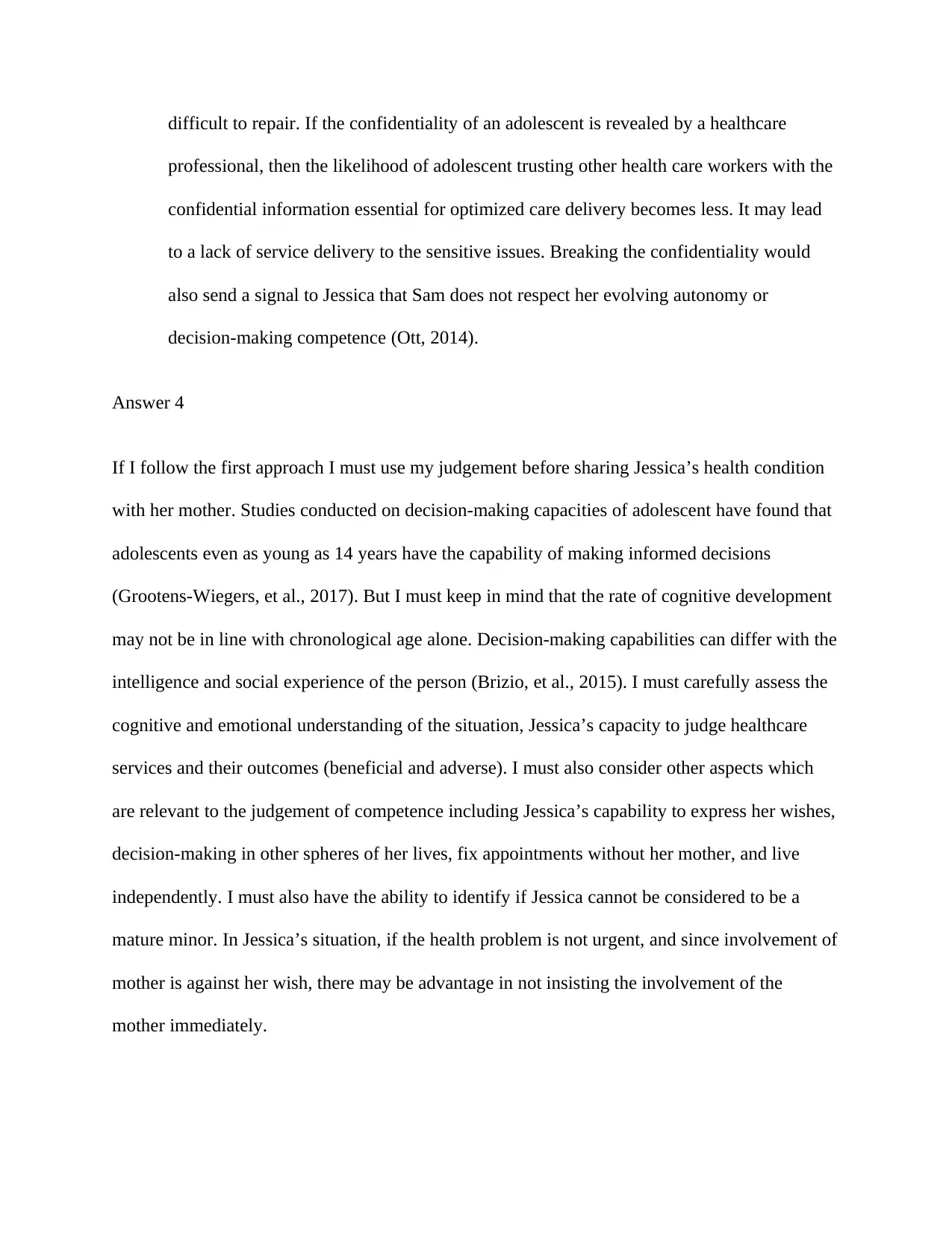
difficult to repair. If the confidentiality of an adolescent is revealed by a healthcare
professional, then the likelihood of adolescent trusting other health care workers with the
confidential information essential for optimized care delivery becomes less. It may lead
to a lack of service delivery to the sensitive issues. Breaking the confidentiality would
also send a signal to Jessica that Sam does not respect her evolving autonomy or
decision-making competence (Ott, 2014).
Answer 4
If I follow the first approach I must use my judgement before sharing Jessica’s health condition
with her mother. Studies conducted on decision-making capacities of adolescent have found that
adolescents even as young as 14 years have the capability of making informed decisions
(Grootens-Wiegers, et al., 2017). But I must keep in mind that the rate of cognitive development
may not be in line with chronological age alone. Decision-making capabilities can differ with the
intelligence and social experience of the person (Brizio, et al., 2015). I must carefully assess the
cognitive and emotional understanding of the situation, Jessica’s capacity to judge healthcare
services and their outcomes (beneficial and adverse). I must also consider other aspects which
are relevant to the judgement of competence including Jessica’s capability to express her wishes,
decision-making in other spheres of her lives, fix appointments without her mother, and live
independently. I must also have the ability to identify if Jessica cannot be considered to be a
mature minor. In Jessica’s situation, if the health problem is not urgent, and since involvement of
mother is against her wish, there may be advantage in not insisting the involvement of the
mother immediately.
professional, then the likelihood of adolescent trusting other health care workers with the
confidential information essential for optimized care delivery becomes less. It may lead
to a lack of service delivery to the sensitive issues. Breaking the confidentiality would
also send a signal to Jessica that Sam does not respect her evolving autonomy or
decision-making competence (Ott, 2014).
Answer 4
If I follow the first approach I must use my judgement before sharing Jessica’s health condition
with her mother. Studies conducted on decision-making capacities of adolescent have found that
adolescents even as young as 14 years have the capability of making informed decisions
(Grootens-Wiegers, et al., 2017). But I must keep in mind that the rate of cognitive development
may not be in line with chronological age alone. Decision-making capabilities can differ with the
intelligence and social experience of the person (Brizio, et al., 2015). I must carefully assess the
cognitive and emotional understanding of the situation, Jessica’s capacity to judge healthcare
services and their outcomes (beneficial and adverse). I must also consider other aspects which
are relevant to the judgement of competence including Jessica’s capability to express her wishes,
decision-making in other spheres of her lives, fix appointments without her mother, and live
independently. I must also have the ability to identify if Jessica cannot be considered to be a
mature minor. In Jessica’s situation, if the health problem is not urgent, and since involvement of
mother is against her wish, there may be advantage in not insisting the involvement of the
mother immediately.
Paraphrase This Document
Need a fresh take? Get an instant paraphrase of this document with our AI Paraphraser
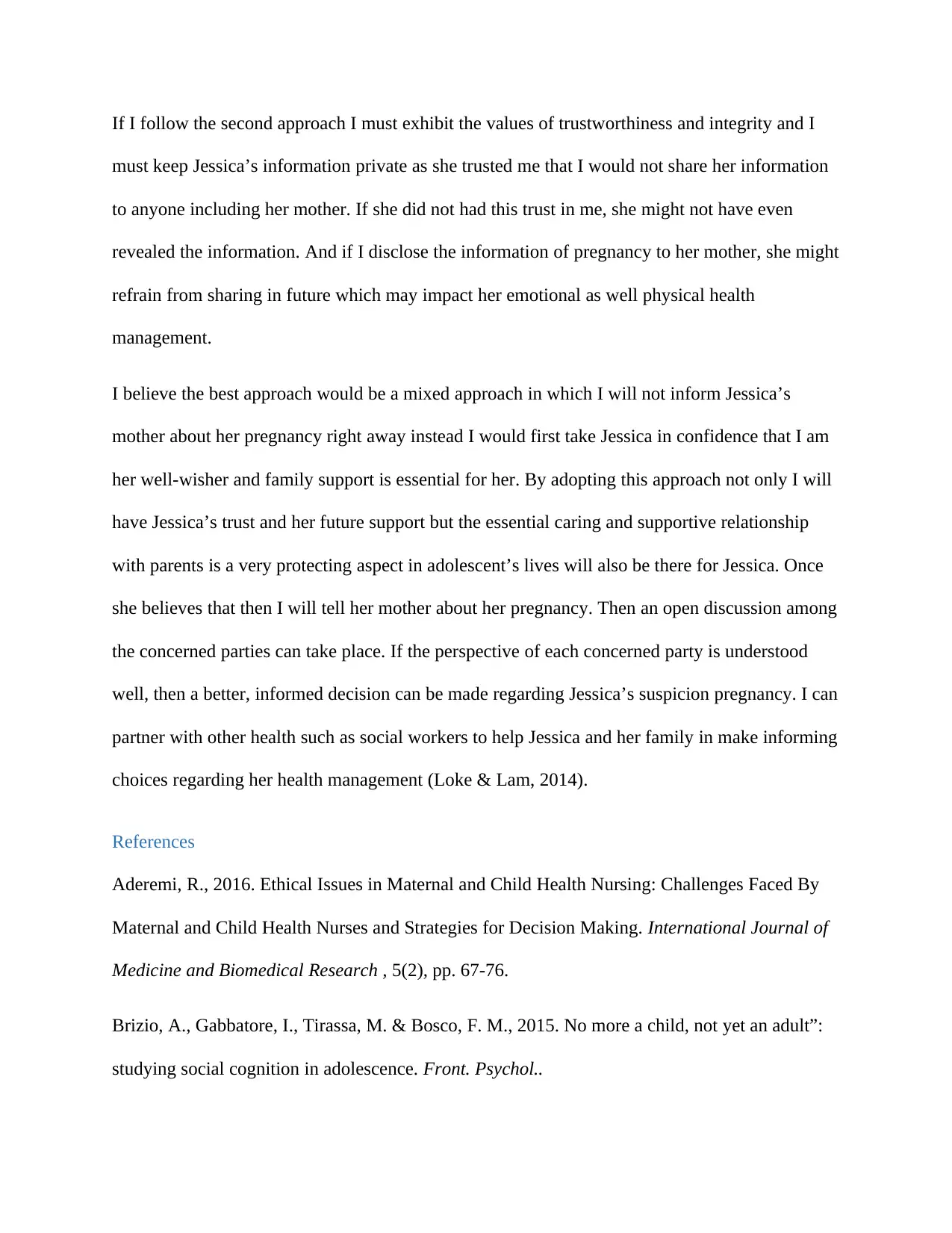
If I follow the second approach I must exhibit the values of trustworthiness and integrity and I
must keep Jessica’s information private as she trusted me that I would not share her information
to anyone including her mother. If she did not had this trust in me, she might not have even
revealed the information. And if I disclose the information of pregnancy to her mother, she might
refrain from sharing in future which may impact her emotional as well physical health
management.
I believe the best approach would be a mixed approach in which I will not inform Jessica’s
mother about her pregnancy right away instead I would first take Jessica in confidence that I am
her well-wisher and family support is essential for her. By adopting this approach not only I will
have Jessica’s trust and her future support but the essential caring and supportive relationship
with parents is a very protecting aspect in adolescent’s lives will also be there for Jessica. Once
she believes that then I will tell her mother about her pregnancy. Then an open discussion among
the concerned parties can take place. If the perspective of each concerned party is understood
well, then a better, informed decision can be made regarding Jessica’s suspicion pregnancy. I can
partner with other health such as social workers to help Jessica and her family in make informing
choices regarding her health management (Loke & Lam, 2014).
References
Aderemi, R., 2016. Ethical Issues in Maternal and Child Health Nursing: Challenges Faced By
Maternal and Child Health Nurses and Strategies for Decision Making. International Journal of
Medicine and Biomedical Research , 5(2), pp. 67-76.
Brizio, A., Gabbatore, I., Tirassa, M. & Bosco, F. M., 2015. No more a child, not yet an adult”:
studying social cognition in adolescence. Front. Psychol..
must keep Jessica’s information private as she trusted me that I would not share her information
to anyone including her mother. If she did not had this trust in me, she might not have even
revealed the information. And if I disclose the information of pregnancy to her mother, she might
refrain from sharing in future which may impact her emotional as well physical health
management.
I believe the best approach would be a mixed approach in which I will not inform Jessica’s
mother about her pregnancy right away instead I would first take Jessica in confidence that I am
her well-wisher and family support is essential for her. By adopting this approach not only I will
have Jessica’s trust and her future support but the essential caring and supportive relationship
with parents is a very protecting aspect in adolescent’s lives will also be there for Jessica. Once
she believes that then I will tell her mother about her pregnancy. Then an open discussion among
the concerned parties can take place. If the perspective of each concerned party is understood
well, then a better, informed decision can be made regarding Jessica’s suspicion pregnancy. I can
partner with other health such as social workers to help Jessica and her family in make informing
choices regarding her health management (Loke & Lam, 2014).
References
Aderemi, R., 2016. Ethical Issues in Maternal and Child Health Nursing: Challenges Faced By
Maternal and Child Health Nurses and Strategies for Decision Making. International Journal of
Medicine and Biomedical Research , 5(2), pp. 67-76.
Brizio, A., Gabbatore, I., Tirassa, M. & Bosco, F. M., 2015. No more a child, not yet an adult”:
studying social cognition in adolescence. Front. Psychol..
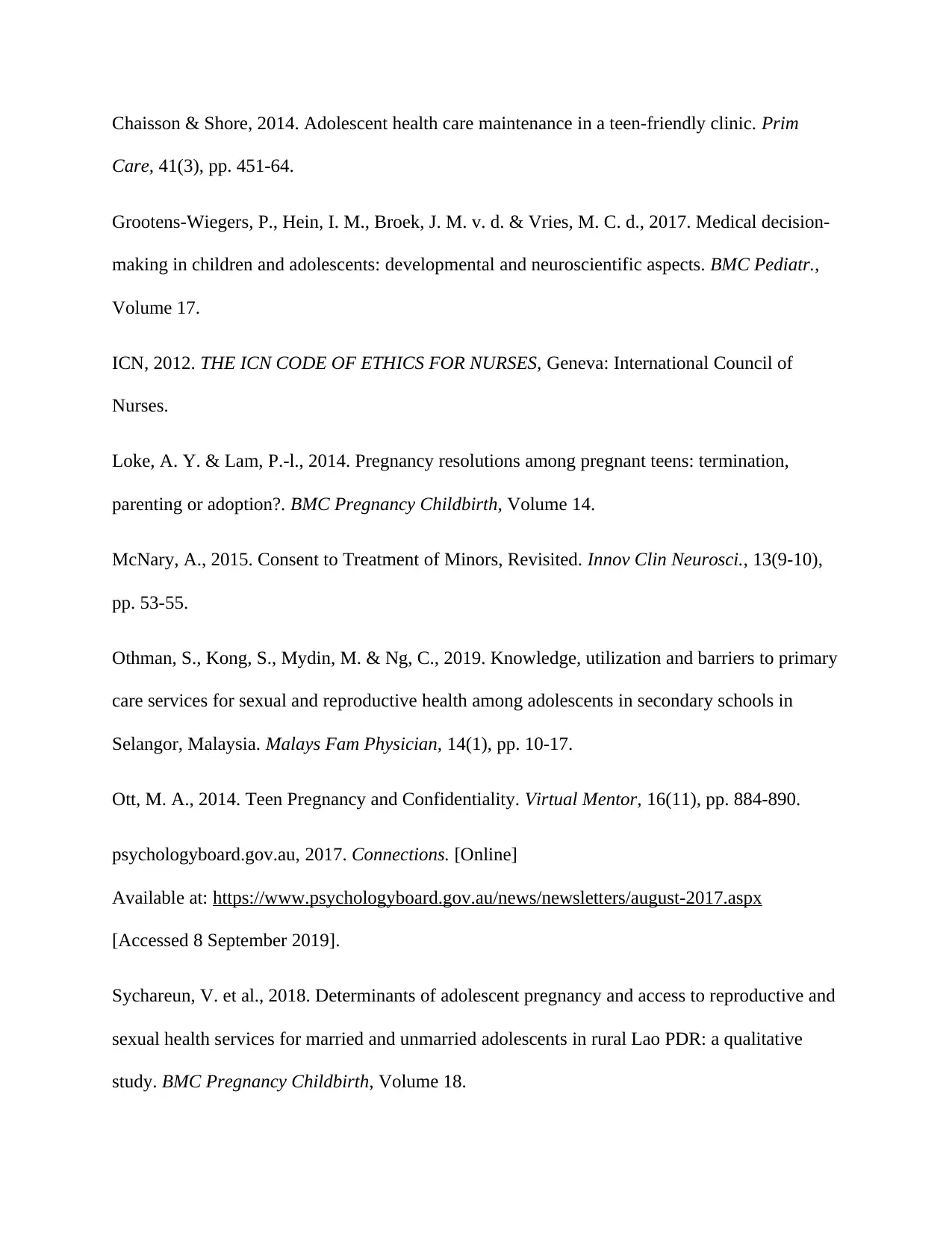
Chaisson & Shore, 2014. Adolescent health care maintenance in a teen-friendly clinic. Prim
Care, 41(3), pp. 451-64.
Grootens-Wiegers, P., Hein, I. M., Broek, J. M. v. d. & Vries, M. C. d., 2017. Medical decision-
making in children and adolescents: developmental and neuroscientific aspects. BMC Pediatr.,
Volume 17.
ICN, 2012. THE ICN CODE OF ETHICS FOR NURSES, Geneva: International Council of
Nurses.
Loke, A. Y. & Lam, P.-l., 2014. Pregnancy resolutions among pregnant teens: termination,
parenting or adoption?. BMC Pregnancy Childbirth, Volume 14.
McNary, A., 2015. Consent to Treatment of Minors, Revisited. Innov Clin Neurosci., 13(9-10),
pp. 53-55.
Othman, S., Kong, S., Mydin, M. & Ng, C., 2019. Knowledge, utilization and barriers to primary
care services for sexual and reproductive health among adolescents in secondary schools in
Selangor, Malaysia. Malays Fam Physician, 14(1), pp. 10-17.
Ott, M. A., 2014. Teen Pregnancy and Confidentiality. Virtual Mentor, 16(11), pp. 884-890.
psychologyboard.gov.au, 2017. Connections. [Online]
Available at: https://www.psychologyboard.gov.au/news/newsletters/august-2017.aspx
[Accessed 8 September 2019].
Sychareun, V. et al., 2018. Determinants of adolescent pregnancy and access to reproductive and
sexual health services for married and unmarried adolescents in rural Lao PDR: a qualitative
study. BMC Pregnancy Childbirth, Volume 18.
Care, 41(3), pp. 451-64.
Grootens-Wiegers, P., Hein, I. M., Broek, J. M. v. d. & Vries, M. C. d., 2017. Medical decision-
making in children and adolescents: developmental and neuroscientific aspects. BMC Pediatr.,
Volume 17.
ICN, 2012. THE ICN CODE OF ETHICS FOR NURSES, Geneva: International Council of
Nurses.
Loke, A. Y. & Lam, P.-l., 2014. Pregnancy resolutions among pregnant teens: termination,
parenting or adoption?. BMC Pregnancy Childbirth, Volume 14.
McNary, A., 2015. Consent to Treatment of Minors, Revisited. Innov Clin Neurosci., 13(9-10),
pp. 53-55.
Othman, S., Kong, S., Mydin, M. & Ng, C., 2019. Knowledge, utilization and barriers to primary
care services for sexual and reproductive health among adolescents in secondary schools in
Selangor, Malaysia. Malays Fam Physician, 14(1), pp. 10-17.
Ott, M. A., 2014. Teen Pregnancy and Confidentiality. Virtual Mentor, 16(11), pp. 884-890.
psychologyboard.gov.au, 2017. Connections. [Online]
Available at: https://www.psychologyboard.gov.au/news/newsletters/august-2017.aspx
[Accessed 8 September 2019].
Sychareun, V. et al., 2018. Determinants of adolescent pregnancy and access to reproductive and
sexual health services for married and unmarried adolescents in rural Lao PDR: a qualitative
study. BMC Pregnancy Childbirth, Volume 18.
⊘ This is a preview!⊘
Do you want full access?
Subscribe today to unlock all pages.

Trusted by 1+ million students worldwide
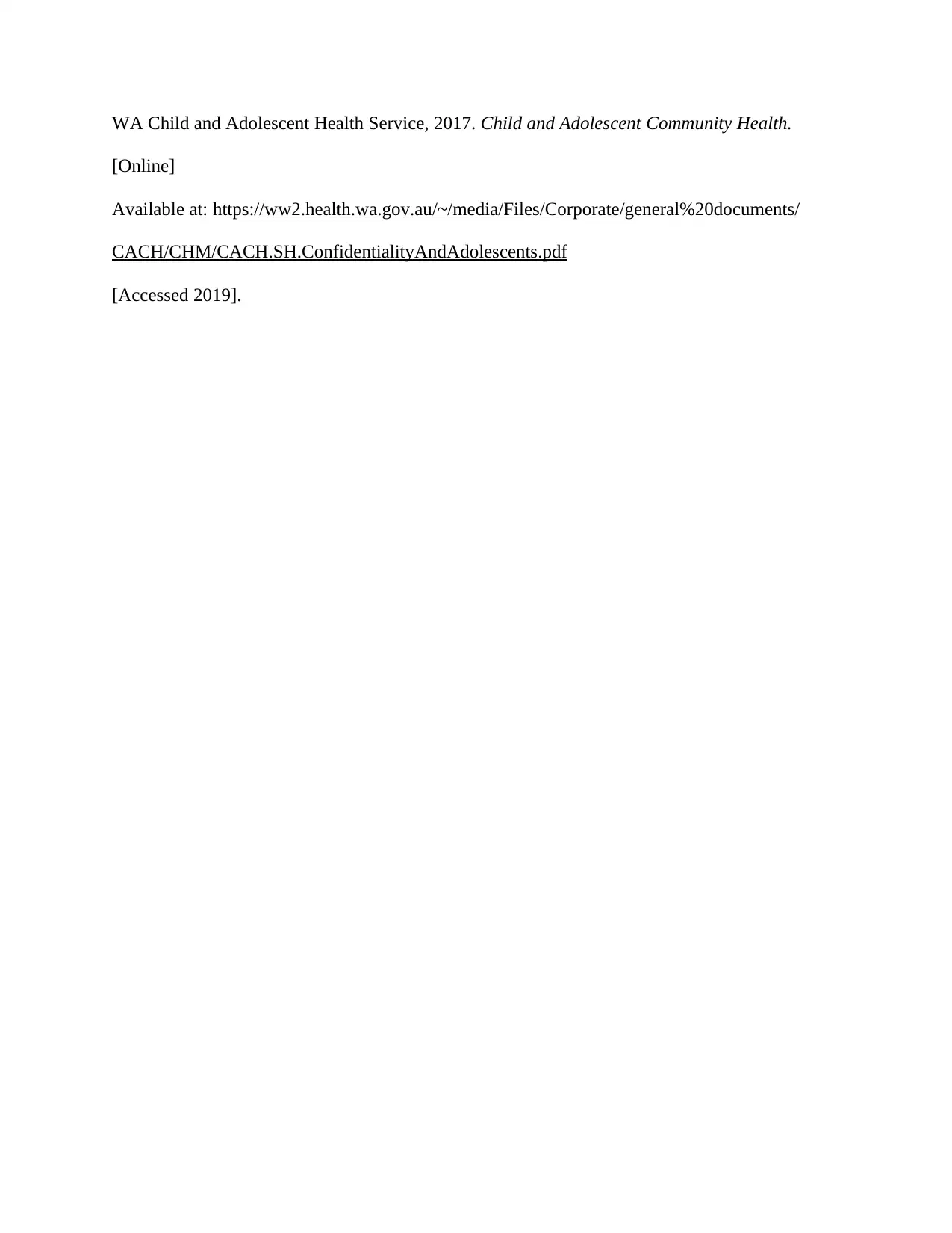
WA Child and Adolescent Health Service, 2017. Child and Adolescent Community Health.
[Online]
Available at: https://ww2.health.wa.gov.au/~/media/Files/Corporate/general%20documents/
CACH/CHM/CACH.SH.ConfidentialityAndAdolescents.pdf
[Accessed 2019].
[Online]
Available at: https://ww2.health.wa.gov.au/~/media/Files/Corporate/general%20documents/
CACH/CHM/CACH.SH.ConfidentialityAndAdolescents.pdf
[Accessed 2019].
1 out of 7
Related Documents
Your All-in-One AI-Powered Toolkit for Academic Success.
+13062052269
info@desklib.com
Available 24*7 on WhatsApp / Email
![[object Object]](/_next/static/media/star-bottom.7253800d.svg)
Unlock your academic potential
Copyright © 2020–2026 A2Z Services. All Rights Reserved. Developed and managed by ZUCOL.



